45% of U.S adults believe Americans are becoming less patriotic
As we head into the Fourth of July weekend, Americans are pretty sure about their own patriotism, though they may not be doing anything especially patriotic this weekend. In the latest Economist/YouGov Poll, four in ten Americans say they are very patriotic, and eight in ten that they are at least somewhat patriotic. But when it comes to the country as a whole, nearly half think the country is becoming less patriotic.
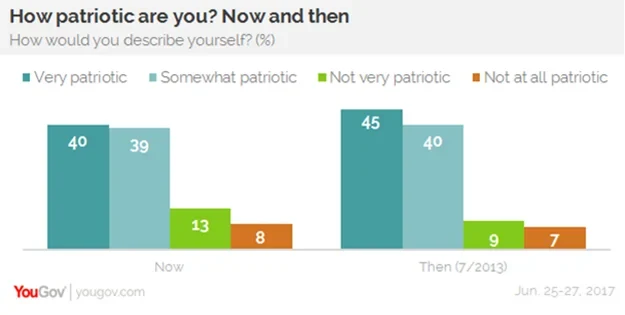
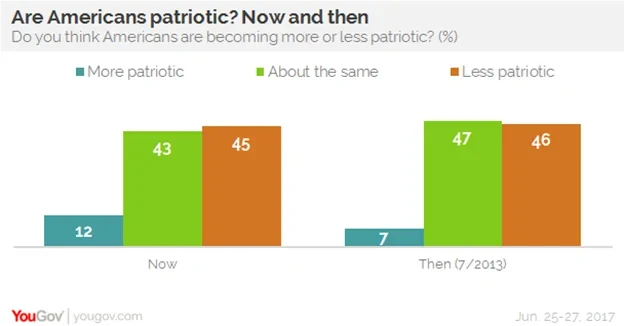
Four years ago, there was a different President, belonging to a different political party. But both now and then Republicans more frequently described themselves as patriotic. Today almost twice as many Republicans as Democrats claim to be very patriotic; that gap was only a little narrower four years ago. Then, 61% of Republicans and 33% of Democrats described themselves as very patriotic. But both now and four years ago, nearly all in both parties claimed some degree of patriotism.
Also, both now and then, the public thought the country was becoming less- not more- patriotic.
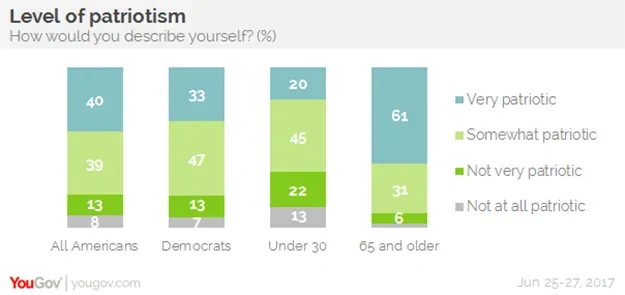
Patriotism is also an identification of the old, not the young. 61% of those 65 and older say they are very patriotic, but just 20% of those under 30 say that about themselves. In fact, more than a third of those between 18 and 29 say they are not patriotic.
Republicans have an edge when it comes to being perceived as patriotic, not only in just saying they are. Nearly half the public sees no difference between the parties on patriotism. But those who do see a difference give that designation to the Republicans. 33% say Republicans are the more patriotic party, while 21% choose the Democrats. Republicans are especially likely to call their own party the more patriotic one, by 78% to 3%. Republicans also get the nod from independents, 25% to 7% (though most independents say there is no difference).
There are political differences in what patriotism means. Democrats are more willing than Republicans to agree that someone can refuse to serve in a war they don’t believe in or to burn an Americans flag and still be patriotic. By a smaller margin, Democrats are more likely to agree that refusing to obey a law they believe is immoral still makes you patriotic. Only one in four think that applies to refusing to pay your taxes.
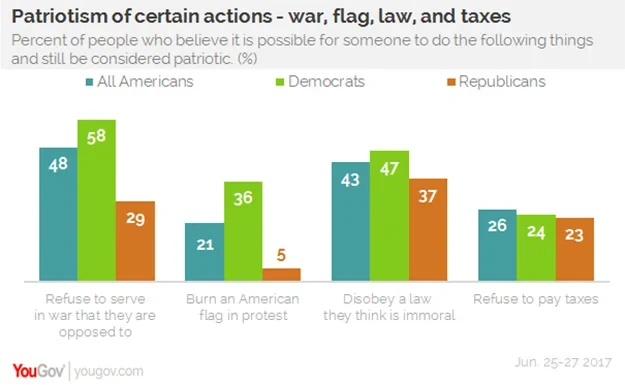
Things have changed on a few of these questions in the last four years. While Democrats today give essentially the same responses now as in 2013 on whether one can refuse to obey an “immoral” law and still be patriotic, Republican agreement this is possible has dropped 11 points. In 2013, Republicans were more likely than Democrats to say one could disobey a law one believed to be immoral and still be patriotic. That is no longer the case. Similarly, the percentage of Democrats who now say you can burn an Americans flag and still be patriotic has jumped 11 points from 25% in 2013. The percentage of Democrats disagreeing has declined 15 points.
The change in Presidents clearly has affected opinions on the patriotic implications of criticizing American leaders. In 2013, Republicans and Democrats were equally likely to think that one could criticize Americans leaders to foreigners and still be patriotic. That is no longer the case. Only a third of Republicans believe it’s okay to criticize American leaders to non-Americans today.
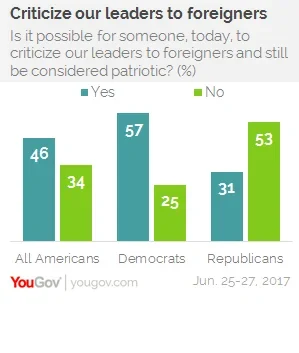
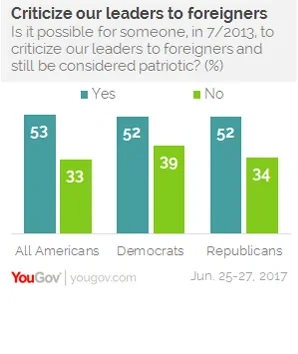
Today, clear majorities of both Republicans and Democrats agree that you can criticize President Donald Trump and former President Barack Obama – at least to other Americans -- and still be patriotic. While more Republicans than Democrats say it’s okay to criticize the former Democratic President, and more Democrats than Republicans think it’s fine to criticize the current Republican one, more than six in ten say their own party’s president can be criticized by patriotic Americans.
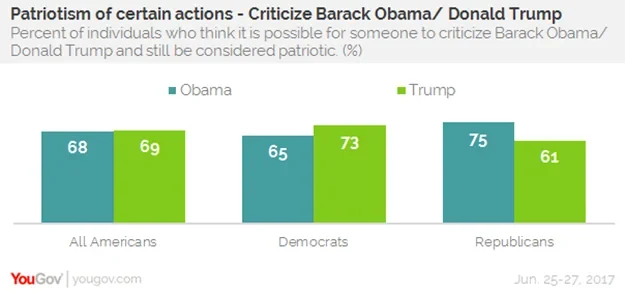
Americans don’t necessarily do identifiably “patriotic” things on the Fourth. Many will be with family, have a cookout, watch TV, or not do anything special. One in ten will go to a local parade or other July 4 event, and even more will watch fireworks displays. For some the fireworks will be DIY: 13% plan on lighting their own fireworks; 18% will watch a professional fireworks display.








